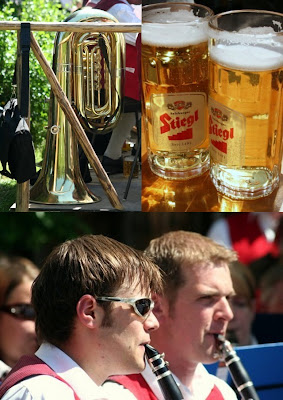My mother tongues are spanish and catalan. I have been lucky enough to be raised on both of them. I think bilingual education is one of the best gifts parents can make to their children because it gives you (almost) twice as many references for free. That's a good thing to have, especially when learning other languages.
I used to learn English in the school, then I used it extensively on my work. I think I was able to speak English quite decently. Then we decided to move to Austria. At first I had to rely on English. I spoke only a little German, really too little to be useful. And I decided to learn the hard way.
I started by setting myself very small goals (like "I won't speak a single word in English at lunch time today") and with a lot of patience and effort and time, I now find myself speaking only German, the whole day. That is really fine, and I would be very happy... were my English not gone! When I now open my mouth to speak English, it is quite probable that a number of German words camouflage within the sentence. Even if I put together all of my concentration to the business, I can't help it! The same happens, to a lesser extent, when writing. I have to focus, the verbs not at the end of the sentence to write! ;)
I have a theory. The (mean) human brain is not really prepared to deal with two foreign languages. It just operates in two modes: "mother language" and "foreign language". The foreign language drawer of my brain, which was then happily populated by English, is now dominated by German. Now when my brain switches to foreign language mode, there's just German there. English seems to be on the background.
I hope my English is not really gone. I try to convince myself that with some more practice everything will be all right. And to begin with that practice, I decided to write this blog in English.
Tuesday, 29 May 2007
Why English?
What's a Frühschoppen?
If you are watching TV in Austria on a holiday around noon, chances are high that you catch an ORF-Fernsehfrühschoppen. A Frühschoppen would be something like a "morning pint" and is quite a tradition here. It consists basically on drinking some pints of beer while a band plays Volksmusik. Frühschoppen are normally attended after going to the church, although some would say instead of going to the church... :)
On distinctive holidays the ORF broadcasts a Frühschoppen from a selected village in Austria. It stars local celebrities and combines music performances and aerial views of the village and its surroundings. I guess it's not easy to get your town a TV-Frühschoppen.
The first time I catched a Fernsehfrühschoppen in TV I was astounded. I did not understand what was going on at all! What was the program about? Was it really about a bunch of people completely unknown to me, funnily dressed up in traditional costumes, happily drinking beer accompanied by alpine music? And that on TV? What a country! :)
My goal by writing this blog is to narrate life in Austria through a foreigner's eyes. I always thought that living abroad is a very healthy and mind-opening experience. I came here with all my spanish biases, just to find that most of them do not apply to austrian life. I had to begin from scratch, building up new biases through my experiences here.
Now I'm writing them down.
Monday, 28 May 2007
Die Murmeltierjahre?
I'm sure everyone remembers the movie "Groundhog Day", where Bill Murray plays a TV weatherman who is sent to Punxsutawney, PA as a Groundhog Day special correspondent, just to find himself waking up on Groundhog Day again and again.
We are living in Salzburg since 2004, having lived in Barcelona before. Salzburg cannot be considered a big city. It has hardly 150.000 inhabitants and a rather provincial air about it, sometimes lovely, at times exasperating, with which we are confronted in our everyday lives. Like basically all rural societies in the world (I guess), major events repeat themselves with an astonishing regularity on a yearly basis. But not only the events happen again and again in Salzburg, year for year. The same is true for the design, the decoration, the colors, the smells... it's the whole look&feel of the city which repeats itself!
That's why sometimes we feel ourselves trapped in a kind of groundhog year, which repeats itself over and over again. A groundhog is called Murmeltier in German. "Die Murmeltierjahre" means "the groundhog years".
Welcome to my very personal account of our Murmeltierjahre in Salzburg!

 versión en español
versión en español






